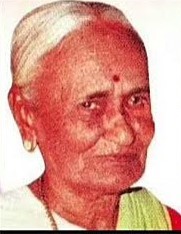
Thiyagi S. N. Sundarambal from Tirupur was a pioneering freedom fighter and social activist who played a prominent role in India’s independence movement and dedicated her life to societal reform and the welfare of the oppressed
Early Life and Background
Sundarambal was born on October 7, 1913, in Veerapandi, Tiruppur, Tamil Nadu. Her father, Natchimuthu Goundar, was a local leader and maniyakkar, providing her a comfortable upbringing and social respect. Despite coming from an affluent background, Sundarambal chose the path of service over privilege, reflecting from an early age a deep sense of justice and empathy for the marginalized.
Entry into Freedom Struggle
Sundarambal’s patriotism blossomed as a teenager. At age 15, during a Congress Party meeting in 1928, Mahatma Gandhi urged attendees to contribute to the fight against British rule. Without hesitation, Sundarambal donated her gold bangles—treasured symbols for a young woman—to Gandhi. He appreciated her gesture, but advised her that true sacrifice would be joining the non-violent movement and wearing khadi instead of British-made clothes. This resolute guidance would shape her life forever; Sundarambal wore khadi for the rest of her days.
Leadership in Protests and Prison Sentences
Sundarambal quickly became a front-line activist in the freedom struggle. She joined protests and rallies, ardently embracing Gandhian methods of resistance. Her activism was not just symbolic—she faced real danger and hardship. During the 1941 Satyagraha, she was arrested along with her newborn son and imprisoned at Vellore Jail for three months—an extraordinary testament to her courage and commitment.
She was again arrested in 1942 during the Quit India Movement, participating in large non-violent demonstrations and spending another seven months behind bars. In 1943, Sundarambal organized a massive protest in Tiruppur, which led to yet another three-month incarceration.
Commitment After Independence
For Sundarambal, the struggle didn’t end with India’s independence. She took up the cause of farmers, fighting for their rights and betterment in the Tiruppur region. Throughout the 1970s, she led several movements and was jailed numerous times while championing agrarian causes and rural welfare.
Sundarambal’s activism extended beyond protest; inspired by Vinoba Bhave, she established an orphanage in Angeripalayam, Tiruppur, providing shelter, education, and care to countless destitute children. She also continued to serve as a local counselor and mentor, spreading Gandhian values and instilling self-respect in future generations.
Personal Life and Character
Despite her fame as “Thiyagi” (martyr) S. N. Sundarambal, she remained humble throughout her life, never seeking recognition or political power. She balanced social activism with family responsibilities and was known for her simple lifestyle and commitment to wearing only khadi, an emblem of her values. Married and the mother of two sons (who predeceased her), Sundarambal’s personal resilience and deep spiritual grounding left an indelible imprint on all she encountered.
Recognition and Legacy
While Sundarambal never sought limelight, her community and admirers celebrate her as a torchbearer of justice. Only two statues dedicated to freedom fighters grace Tiruppur: one for “Tiruppur” Kumaran and another for S. N. Sundarambal. Her name is evoked with reverence at public events, particularly during her birth and death anniversaries (October 7, 1913 — August 20, 2007).
Through her relentless struggle, she challenged not only the colonial regime but also gender norms, inspiring generations of women and underprivileged to assert their rights. Her life’s story is a testament to the transformative power of selfless sacrifice and ethical conviction.
Impact on Tiruppur
Sundarambal is an integral figure in Tiruppur’s history. Her leadership during large-scale demonstrations in the 1940s mobilized local resistance and forged a legacy of civic participation. She remains a symbol of the city’s proud association with India’s struggle for freedom and of its enduring spirit of social reform.
Notable Anecdotes and Symbols
- The Gold Bangles: Sundarambal’s act of donating her bangles to Gandhi became a symbolic turning point, representing her total renunciation of material wealth in favor of a higher cause.newindianexpressyoutube
- Motherhood and Sacrifice: Being arrested with her newborn illustrates her dual identity as both caregiver and warrior—shattering stereotypes about women’s roles in times of crisis.youtubenewindianexpress
- Khadi for Life: Her life-long preference for khadi clothing encapsulated her belief in self-reliance and rejection of colonial imports
Influence Beyond Freedom Struggle
Sundarambal’s influence extended into social welfare, rural education, and community health post-independence. The orphanage in Angeripalayam stands as a living testament to her compassion and organizational prowess. By empowering women and the poor, she contributed to the slow transformation of social hierarchies in Tamil Nadu .
Lessons from Her Life
- Courage in Adversity: Sundarambal’s story underscores the importance of standing up for justice, regardless of personal hardship.youtubenewindianexpress
- Gender and Leadership: She redefined what women could achieve in public life, showing that courage, intellect, and empathy transcend gender.newindianexpress+1
- Simplicity and Integrity: Her adherence to Gandhian values reminds us that true leadership springs from humility, service, and a commitment to truth.
Conclusion
Thiyagi S. N. Sundarambal’s contribution to the Indian freedom movement and to her community is immeasurable. Her legacy serves as an inspiration for anyone striving for social justice and reminds us of the silent heroism that built modern India—one woman’s steadfast devotion to her ideals transformed countless lives and left an enduring mark on the nation’s conscience.









